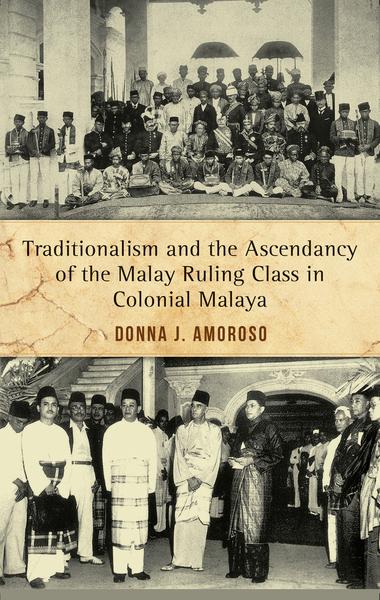Academic Thread: "Traditionalism and the Ascendancy of the Malay Ruling Class in Colonial Malaya" by Donna J. Amoroso –– This work argues that the British colonial power utilised and reinvented the tradition of the Malay ruling class to secure its economic & political needs.
Before I begin, this book was, sadly, published posthumously. Apparently, she was somewhat reluctant to publish her PhD Dissertation–– which boggles me because I find her argument to be very convincing and rather illuminating and I'm sure there a lot of other scholars that agrees
For her as well as for many others, tradition is "a body of customary practices and rituals inherited from past generations." Traditionalism, on the other hand, refers to "the conscious and formal use of tradition in order
to bolster one’s political and economic positions."
to bolster one’s political and economic positions."
The British knew the importance of Malay tradition & therefore utilized it to their advantage, but not just through 'preservation' but also through 'reinvention.' Through indirect ruling, they centralised the power to the raja and they emasculated the Malay chiefs
because it was easier for control via treating them like absolute monarchs. Most fascinatingly, they elevated the status and prestige of the Malay rulers. For example, royal public ceremonies now acquired the grandeur usually associated with European royalty. You can see also
the costume changes of the rulers, (adopted British military uniform and so on). New elements such as gun salutes heightened the formal ambience of royal functions. The rulers are also now visible with new mode of transportation that consisted them being driven in luxurious cars
Now... why does this matter again? The rulers became more glamorous and so what? This is where, traditionalism comes into the picture, despite British introduction of new features, sufficient ancient elements were retained to ensure that the ceremonies looked familiar.
As Amoroso claims, “glamorised and visible Malay
rulers helped disguise the highly interventionist nature of indirect rule, offering proof that British Malaya still consisted of sovereign Malayo-Muslim Sultanates” (p. 66). The British indirect rule helped produce a facade that––
rulers helped disguise the highly interventionist nature of indirect rule, offering proof that British Malaya still consisted of sovereign Malayo-Muslim Sultanates” (p. 66). The British indirect rule helped produce a facade that––
it was as if the Malay rulers were still in control by preserving yet enhancing their prestige. When, in fact, it was the British that was actually pretty much in control of the sultanates because the rajas actually lost most of their power to the British. Such a paradox right?
In other words, the rajas looked powerful & great but in actuality they lost most of their power to the British. There are exceptions such as in the case of Johor, I would say, but I'm not going into more details about why Johor under Sultan Abu Bakar provide an interesting case.
However, the British facade of their indirect rule was destroyed by none other than the Japanese Occupation. When they rakyat saw the rulers were powerless and in fact had to bow down to the Japanese. The Japanese did not bother preserving the sovereignty of rulers and instead...
they privileged the bureaucratic elites
who could run efficiently run their administrative machinery. The impact of the Japanese Occupation led to rise of mass politics–– the ascendancy
of radical nationalist movements such as the Pan-Malay organisation,Kesatuan Melayu Muda (KMM)
who could run efficiently run their administrative machinery. The impact of the Japanese Occupation led to rise of mass politics–– the ascendancy
of radical nationalist movements such as the Pan-Malay organisation,Kesatuan Melayu Muda (KMM)
When the British returned to Malaya,
they could no longer reverse this political dynamism, as nationalism increased dramatically. Post-war Malay politics was dominated by the competition between the Malay elites and the 'radicals'. But we all know the Malay elites eventually won.
they could no longer reverse this political dynamism, as nationalism increased dramatically. Post-war Malay politics was dominated by the competition between the Malay elites and the 'radicals'. But we all know the Malay elites eventually won.
The question is how did they do it? One of the important ways, Amoroso argued, is through traditionalism that was no longer in the hands of the British–– instead it fell into the hands of Malau elites, particularly UMNO.
By presenting themselves as the defender of the now
powerless Malay royal institutions, the elites were in a better position to win the support of the Malays, and dismiss the radicals as traitors. Malay rulers did not have a choice because they knew that the only way for them to
powerless Malay royal institutions, the elites were in a better position to win the support of the Malays, and dismiss the radicals as traitors. Malay rulers did not have a choice because they knew that the only way for them to
survive is to go with the plans of UMNO. Malayan Union would have abolished their position, and the radicals would have preferred for a republic instead. The Malay elites highlighted to the masses the vitality of the
royal institutions for the survival of the Malay, from other
royal institutions for the survival of the Malay, from other
races while simultaneously reminding the rulers with the need to respect the will of the rakyat. By doing this, they significantly redefined the traditional meaning of 'ta'at' loyalty and how the raja is, in fact, the custodian and protector of Malay rights and society.
It's a pretty short one! But I've always found this work to be really fascinating because it explains a lot in terms of how British colonial order impacted the path towards independence, and the continued importance of Malay royal class in today's politics.
If both Malaya and North Borneo were to be under the Dutch instead? I am rather curious to know, what would both Malaysia and Brunei look like today...?

 Read on Twitter
Read on Twitter


